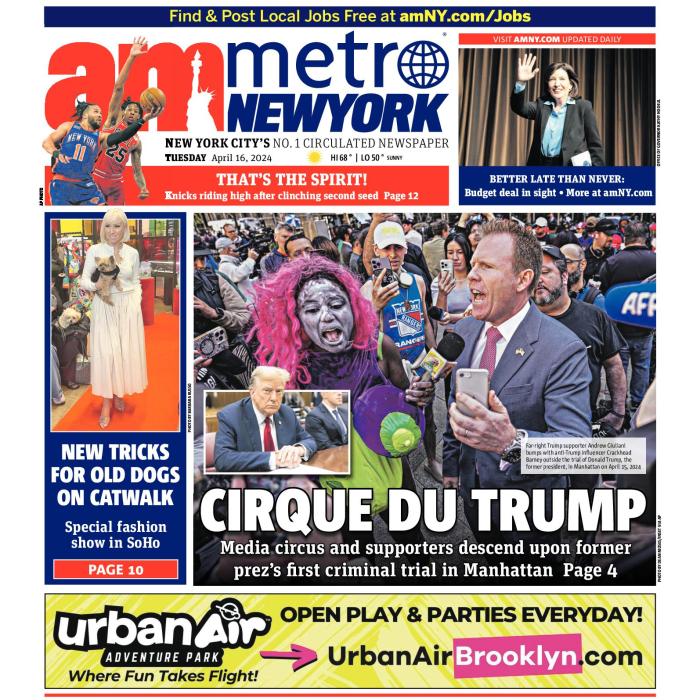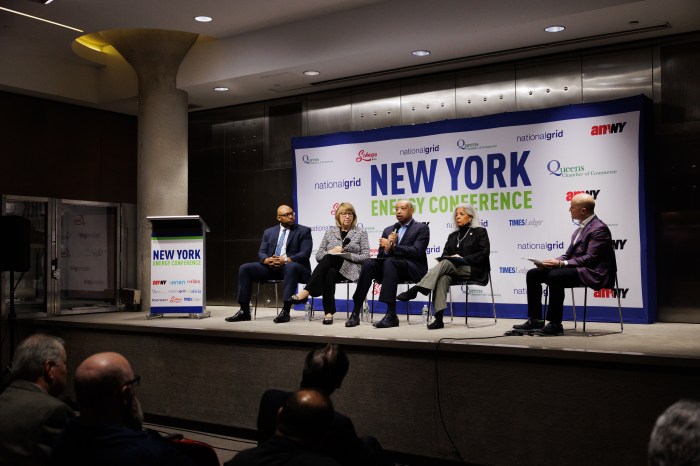Domhnall Gleeson is the son of acting royalty — his father Brendan is one of the giants in the business — and he’s inherited a good deal of his dad’s talent.
The 31-year-old has played a romantic lead, a Weasley in the “Harry Potter” series and Konstantin Levin in the most recent “Anna Karenina”. He can currently be seen in an intense scene alongside his father in the drama “Calvary” and is co-starring in a little movie you might have heard of called “Star Wars: Episode VII.”
amNewYork spoke with Gleeson about another new project, the offbeat punk comedy “Frank,” in which he stars alongside Michael Fassbender, who sports a giant papier-mâché head throughout. The dark comedy, centered on a dysfunctional band of misfits, opens Friday.
Q: I can think of a million reasons to do a film like this. What resonated most for you?
A: There are just so many different reasons to want to do this film. I thought the script was really funny and different. I had no idea how to make it into a feature film. That’s another great thing. When you read a script and say, “This is amazing, but how do we do it”?
Q: Can you elaborate on that?
A: The script has such a strange sensibility, such a unique and odd sensibility that read phenomenally well but you just think, “I don’t know how you film that and retain the essence of the script,” because as soon as you make things real you use that ethereal quality which the script has. So it was about keeping a lot of magic and danger and uncertainty in the feeling of the film. You wanted a certain sense of anarchy, I think, in what is actually a controlled story.
Q: Michael Fassbender’s performance is remarkably difficult. What’s it like acting opposite him?
A: It was phenomenal to work with him. It’s funny, you get some people asking you, “Oh, it must have been weird then, because you get to act with Michael Fassbender but then he’s wearing the mask,” as though that lessens the joy of acting with somebody who is amazing.
Q: Your character is our window into Frank’s musical family, but he’s also a disruptive force.
A: He wants to be a famous musician, he wants to be a respected songwriter; he’s got no talent. So in a way, the movie deals with that notion. Everybody’s told you can be whatever you want to be. That’s patently untrue.
Q: You’ve done a lot of interesting work in recent years.
A: The quality of scripts that I get to read has certainly developed over the last three years, four years. There were certain points in my life where people believed in me being able to deliver more than I did myself. … I think a big leap was “Anna Karenina.” That was a huge thing. [Director] Joe Wright decided I could be romantic in a film. That was not something I thought anybody would ever let me do because it wasn’t necessarily how I saw myself.
Q: “Frank” can seem a bit opaque, at first, but it really stays with you. Is there value in that?
A: It will be that movie for some people. I think what saves it, the bit of it that helps the instantaneousness of it is the fact that there are laughs in it. If you don’t quite understand it while it’s happening I think the laughs sweeten the pill a little bit. And then I think creating that stays with people is rare, particularly these days, and this film seems to do that, so I think it’s a hugely valuable thing.
Q: You have an intense scene with your father in “Calvary.” What was that like?
A: It was difficult. It was exhilarating because I knew that what we were doing was good work and it felt real. But it was difficult. I didn’t talk to my dad for a week or two beforehand. We kind of went to our separate corners in the same way in the movies when two brothers have to box each other. They go their separate ways but they hug afterwards. It was a similar thing.
Q: Without risking spoilers, what’s been your experience on “Star Wars” so far?
A: First of all, [director] J.J. [Abrams] is fantastic. I was a fan of his work beforehand and really, the reason for me to want to do this film is to get to work with J.J. That’s why you go to the meeting and you do the whole thing. So that is a dream come true. The only problem that comes with a movie of that size is that because it takes a long time sometimes to set up a shot, for example, or because there’s a lot of money riding on everything … the danger is that you start thinking or you start playing it safe, because the stakes are so high in terms of money and time and pressure and all this stuff. What you have to do is remind yourself before a take starts, even if it’s taking a half-hour to set up the shot, that you have to follow your impulses.














